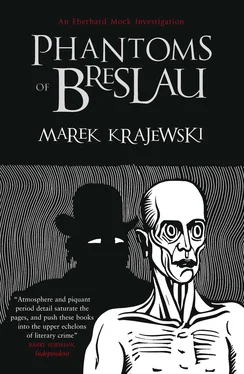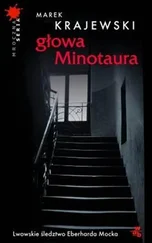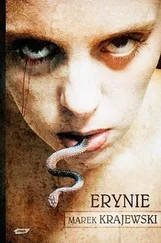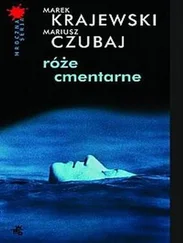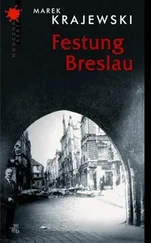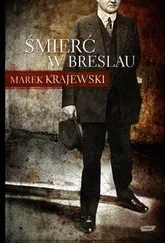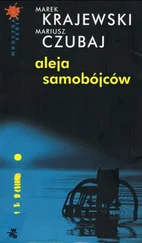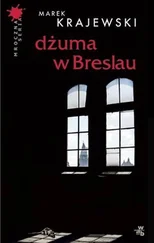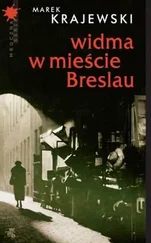Marek Krajewski - Phantoms of Breslau
Здесь есть возможность читать онлайн «Marek Krajewski - Phantoms of Breslau» весь текст электронной книги совершенно бесплатно (целиком полную версию без сокращений). В некоторых случаях можно слушать аудио, скачать через торрент в формате fb2 и присутствует краткое содержание. Жанр: Полицейский детектив, на английском языке. Описание произведения, (предисловие) а так же отзывы посетителей доступны на портале библиотеки ЛибКат.
- Название:Phantoms of Breslau
- Автор:
- Жанр:
- Год:неизвестен
- ISBN:нет данных
- Рейтинг книги:3 / 5. Голосов: 1
-
Избранное:Добавить в избранное
- Отзывы:
-
Ваша оценка:
- 60
- 1
- 2
- 3
- 4
- 5
Phantoms of Breslau: краткое содержание, описание и аннотация
Предлагаем к чтению аннотацию, описание, краткое содержание или предисловие (зависит от того, что написал сам автор книги «Phantoms of Breslau»). Если вы не нашли необходимую информацию о книге — напишите в комментариях, мы постараемся отыскать её.
Phantoms of Breslau — читать онлайн бесплатно полную книгу (весь текст) целиком
Ниже представлен текст книги, разбитый по страницам. Система сохранения места последней прочитанной страницы, позволяет с удобством читать онлайн бесплатно книгу «Phantoms of Breslau», без необходимости каждый раз заново искать на чём Вы остановились. Поставьте закладку, и сможете в любой момент перейти на страницу, на которой закончили чтение.
Интервал:
Закладка:
“‘I was forced to write the letter you’re going to get from him,’” Mrs Wohsedt’s voice sang. “‘I do not have, nor ever have had a mistress. I love only you. Julius Wohsedt.’”
“‘… You can easily check,’” Smolorz continued reading. “‘She has the same eczema as I do. Julius Wohsedt.’”
“When did you get this letter?” Mock asked.
“At about eight.” Mrs Wohsedt’s lips turned into a horseshoe. She had clearly got to the part about the torture. “I was waiting for Julius on the terrace. I was worried he hadn’t come home yet.”
“The postman came and handed you the letter?”
“No, some scruff on a bicycle came to the fence, threw the envelope on the path, then quickly rode away.”
“Mock, sir,” Smolorz said before his chief could ask about the “scruff’s” appearance. “There’s something else …”
Mock looked at the squared sheet of paper. He ran the tip of his tongue over his rough palate and felt extremely thirsty. Faint fumes of alcohol emanated from his body, and his head was absorbing the heavy acids of a hangover.
“Lost your tongue, Smolorz?” hissed Mock. “Why the hell are you showing me this? You’ve just read it.”
“Not all of it.” Smolorz’s pale and freckled face turned pink. “There’s something else on the back …”
“Then read it, damn it!”
“‘Blessed are those who have not seen and yet have believed. Mock, admit your mistake, admit you have come to believe. If you do not want to see any more gouged eyes, admit your mistake.’” Smolorz turned purple. “There’s a postscript too: ‘South Park.’”
“Didn’t I tell you, didn’t I tell you,” Mrs Wohsedt said in a high singsong. “I told you he went to South Park with the dog …”
“A long walk,” muttered Smolorz as Mock tried hard to force from his mind the hideous thought that had occurred to him.
They left the port director’s house and climbed into the gig. As they set off towards Kaiser-Wilhelm-Strasse, Smolorz said to Mock:
“This might be silly, Mock, sir, but it’s no wonder the director had another woman.”
Mock did not say anything. He did not want to admit even to himself that the hideous thought which had tormented him from the moment he set eyes on Mrs Wohsedt had now been put into words.
BRESLAU, THAT SAME SEPTEMBER 4TH, 1919
FIVE O’CLOCK IN THE MORNING
South Park was completely empty at this hour. In the alleyway leading from Kaiser-Wilhelm-Strasse appeared the figure of a woman in a long dress. Next to her, tugging her from side to side, trotted a large dog. The cold, pale-pink glow of the goddess Eos sharpened the image: the woman wore a bonnet, and on her body was not a dress, but a coat from beneath which trailed the straps of a nightgown. She was walking briskly, not allowing the dog to stop for any length of time to do what a dog sets out to do on its morning walk. She passed the pond and skipped along the footbridge, hastened by the sight of a man in a peaked cap standing beneath a tree. She ran to him and threw herself into his arms. Now left to its own devices, the giant schnauzer bucked up at its mistress’ decision. The man twisted his moustache, turned the woman around and pulled up her nightdress. The woman bent over, supported her hands on the tree and noted with relief that no lights were burning in the enormous edifice of the Hungarian King Hotel and Restaurant. All of a sudden the dog growled. The man in the peaked cap stopped unbuttoning his trousers and looked round.
Some fifty metres from them two men were forcing their way through the bushes. Both wore bowler hats and had cigarettes between their teeth. The shorter one kept stopping, grasping his stomach and groaning loudly.
“Quiet, Bert,” the woman whispered as she stroked the dog. Bert growled softly and watched the two men shake thick drops of dew from their clothes.
The shorter man removed his bowler and wiped the sweat from his brow, and the two of them continued on their way towards the pond where some fat swans had now appeared. Suddenly the shorter of the two stopped and said something loudly, which the woman understood as: “Oh, damn it!” and her partner as: “Oh, fuck!” The groaning man handed his bowler and coat to his taller companion and, pressing his thighs together, he pushed his way into the bushes and squatted. The unfulfilled lover decided to carry on with humankind’s eternal act, but his consort had a different idea. She tied the dog to a tree and hid behind it. Leaning out a little, she watched anxiously as the squatting man ran his fingers over his cheek, looked at them carefully, then looked up. Once again he blurted out the words which the maid and her lover had understood so differently, but now his voice was amplified by horror. At the crown of the old plane tree swung a man hanging by his legs. The dog yelped, the woman screamed and her lover saw a freckled hand covered in red hair with a gun aimed at his nose. The early morning tryst had ended in total disaster.
BRESLAU, THAT SAME SEPTEMBER 4TH, 1919
HALF PAST FIVE IN THE MORNING
Mock was familiar with the right wing of South Park Restaurant. There was a hotel in the wing where two rooms were forever reserved. Just under a year earlier, when he and Cornelius Ruhtgard had been sent, much to their delight, on a Polish train to Warsaw, where the Poles disarmed them, both had sensed a favourable wind at their backs. They had passed through Lodz and Posen on their way to the Silesian metropolis which, as Mock assured his friend, was to Konigsberg like fat carp to dry cod. On arriving in Breslau they had lodged with Franz, Mock’s brother, and that same day they had gone to South Park Restaurant. Their table had been next to the pond, by the stone steps leading down to the water, and the autumn sun had been exceptionally strong that day. Conversation had flagged because Mock’s eight-year-old nephew Erwin, bored by his uncle’s wartime stories and fed up with feeding indifferent swans, had kept on interrupting. Everyone had feigned distress at losing the war, when in fact all had been thinking about their own affairs: Franz about his frigid wife; Irmgard about little Erwin’s tendency to tears and melancholy; Erwin about the gun which he believed must be hidden in his uncle’s backpack; Ruhtgard about his daughter Christel, who was taking her final exams that year at a Hamburg boarding school for well-born young ladies, and whom he was to bring to Breslau; and Eberhard Mock about his dying mother in Waldenburg, with the old shoemaker Willibald Mock sitting at her side, trying to hide the tears that ran down the furrows on his face. When Franz’s family had hurriedly said their farewells and set off for the nearby tram terminus, Mock and Ruhtgard sat in silence. The festive mood which accompanied them through the elegant restaurants of Warsaw, the dens of Lodz that smelled of onions, and the steamed-up restaurants of Posen, had somehow evaporated into thin air. As they were knocking back their second tankard of beer that day, they had been approached by a head waiter endowed with impressive whiskers. As he changed their ashtray, he had smacked his lips and winked. Mock knew what that meant. Without a moment’s hesitation they had paid and gone up to the first floor of the hotel where, in the company of two young ladies, they had celebrated the end of the war.
That same head waiter was now sitting on reception. He did not wink or smack his lips; his eyelids and lips were glued together with sleep. Mock did not need to show his identification. Over the course of the year, head waiter Bielick had become well acquainted with Criminal Assistant Mock from the Vice Department of the Police Praesidium, and he did not feel like laughing.
Читать дальшеИнтервал:
Закладка:
Похожие книги на «Phantoms of Breslau»
Представляем Вашему вниманию похожие книги на «Phantoms of Breslau» списком для выбора. Мы отобрали схожую по названию и смыслу литературу в надежде предоставить читателям больше вариантов отыскать новые, интересные, ещё непрочитанные произведения.
Обсуждение, отзывы о книге «Phantoms of Breslau» и просто собственные мнения читателей. Оставьте ваши комментарии, напишите, что Вы думаете о произведении, его смысле или главных героях. Укажите что конкретно понравилось, а что нет, и почему Вы так считаете.
